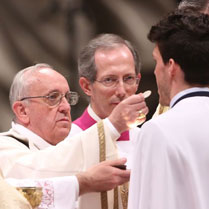An interesting diversion has occurred in the comment thread below my post on Christian Unity.
In a discussion on the sacramental communion of non-Catholics, the issue of spiritual communion was raised. St Alphonsus Liguori’s traditional formula was quoted:
Lord, since I cannot now receive you sacramentally, come at least spiritually into my heart.
My personal favourite is a Piarist formula, taught to St Josemaría Escrivá when he was a child, and since popularised by Opus Dei:
I wish my Lord to receive you with the purity, humility and devotion with which your most holy mother received you; with the spirit and fervour of the saints.
Spiritual communion is an old Catholic devotion which, like “the visit to the Blessed Sacrament,” has receded in recent times.
(The late Frank Devine was once waiting in the foyer of a large Catholic school when he indicated to the secretary that he’d “pay a visit.” That’s traditional Catholic speak for spending a few minutes in front of the tabernacle and making a spiritual communion. But as he made for the chapel, the secretary called out to him. “Mr Devine, you’re heading towards to the chapel. The toilets are the other way!”)
In his final encyclical, Pope John Paul II urged Catholics to reclaim the practice of spiritual communions:
It is good to cultivate in our hearts a constant desire for the sacrament of the Eucharist. This was the origin of the practice of “spiritual communion,” which has happily been established in the Church for centuries and recommended by saints who were masters of the spiritual life. St Teresa of Jesus wrote: “When you do not receive communion and you do not attend Mass, you can make a spiritual communion, which is a most beneficial practice; by it the love of God will be greatly impressed on you.”
Ecclesia de Eucharistia, 34.
St Thomas Aquinas and St Alphonsus Liguori – like St Teresa, Doctors of the Church – agreed that spiritual communion can be as great as sacramental communion. In both instances, if Jesus is welcomed with love, and given due attention, abundant grace flows.
Clearly, then, it’s advisable to make frequent spiritual communions. There is no limit to spiritual communions – we can make as many as we like, unlike sacramental communion (no more than twice in one day).
But what about spiritual communion as an unnecessary substitute for sacramental communion? What if you’re at Mass, you have no mortal sins you need to confess, but when it comes time for communion, you have no desire to join the queue? What if the idea of sacramental communion is nothing short of repugnant? Not because God is repugnant – you still came to Mass, after all – but because scruples or acedia or a sincere and profound sense of humility compels you to maintain a reverent distance from God. What then?
A case could be made for a sort of “holy abstinence” from the Eucharist. Insofar as it increases one’s reverence and piety, abstaining is a good thing, and making a spiritual communion instead is advisable.
But I’m not convinced. I imagine that our worthy reception of the Eucharist is a source of great joy to the Lord. He wants communion with us not only because it’s good for us, but because he loves us and wants to be close to us. So we receive communion not only for our sake, but for his sake too. It pleases him.
If I’ve got nothing against a mate, but I just don’t want to see him, and so I then refuse to see him, despite his objections … How is that not an act of selfishness?
Therefore, if we truly love Jesus, we will put aside our own feelings and dispositions when approaching the sacrament. If there is no objective reason to abstain, we should always make a sacramental communion.






Thanks Father, for that reflection. I really appreciate it. I didn’t really know of spiritual communion, and I think I’ll practice that from now on.
Cheers!
Well, that’s great to hear! Thanks Samuel!
Peace.
FATHER JOHN, thank you for your Spiritual Communion article. I often need to practice. Be it that I am unworthy to receive HOLY COMMUNION or as I receive on the tongue, the reactions sometimes are very sad from one of our local Priests.
St. Gabriel communications in WEST AUST. print a fold up PRAYERS BEFORE AND AFTER HOLY COMMUNION CARD. Their website: http://www.SaintGabriel.com.au.
JOHN.